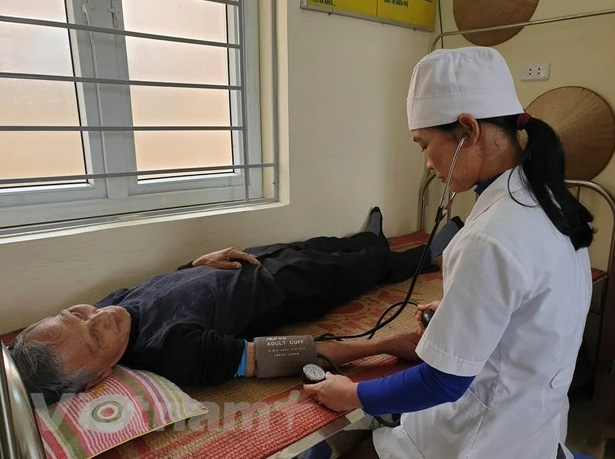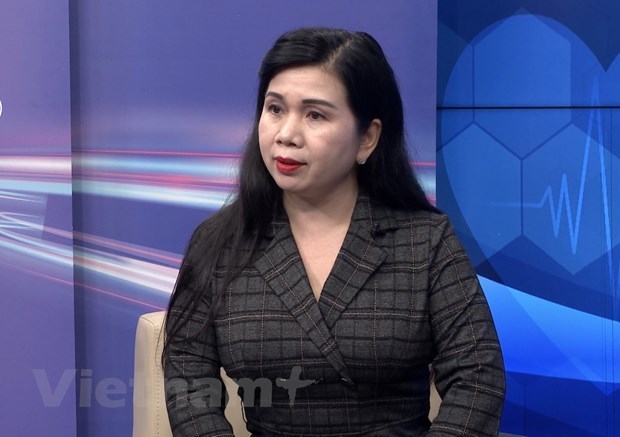 A healthcare worker at a commune healthcare centre conducts check-ups for local residents. (Photo: Vietnam+)
A healthcare worker at a commune healthcare centre conducts check-ups for local residents. (Photo: Vietnam+)Hanoi (VNA) – Directive No. 25-CT/TW on “continuing to consolidate, perfect and improve the quality of healthcare activities on the basis of the new situation” was just issued by the Party Central Committee Secretariat on October 25, 2023.
In an interviewed granted for the press, Associate Professor Phan Le Thu Hang – Deputy Director of the Department of Financial Planning under the Ministry of Health, and Director of the Project Management Board for Construction Investment and Development provides further details.
– Please tell us more about the purpose of the Directive?
Associate Professor Phan Le Thu Hang:
Over the course of 20 years, Vietnam’s grassroots healthcare system has made significant strides, achieving important milestones. The comprehensive network now spans the entire country and boasts enhanced facilities and skilled personnel. Undoubtedly, the remarkable achievements of Vietnam’s healthcare system can be attributed to the dedicated efforts of the grassroots health network.
In recent years, Vietnam’s healthcare network has garnered international recognition and is hailed as a role model in achieving ahead of schedule. Notably, this network plays a vital role in effectively addressing the challenges posed by various epidemics, either classic, re-emerging, or emerging.
However, despite its commendable achievements, the grassroots healthcare network still faces several shortcomings. These needs include facilities, human resources, equipment, and medical supplies. Consequently, investment in enhancing the capacity of the healthcare system is imperative to ensure equitable access to healthcare services while minimising costs.
Seven strategic points
– Please highlights the new points in the Directive No. 25-CT/TW on “continuing to consolidate, perfect and improve the quality of health care activities on the basis of the new situation”?
Associate Professor Phan Le Thu Hang:
I would like to emphasize seven key highlights from Directive No. 25-CT/TW issued by the Party Central Committee Secretariat, which focuses on “strengthening, refining, and enhancing the quality of healthcare activities in light of the current circumstances.”
First, the directive specifically outlines priorities in grassroots healthcare, underscoring the importance of raising awareness and responsibility among authorities at all levels regarding the role and significance of grassroots healthcare. This emphasis aligns with global trends and Vietnam’s own practical experiences.
 Associate Professor Phan Le Thu Hang (Photo: +)
Associate Professor Phan Le Thu Hang (Photo: +)Secondly, the new Directive highlights the importance of coordination among various agencies and organisations in the formulation and implementation of guidelines, policies, and laws pertaining to grassroots healthcare. This approach aligns with the global perspective on primary healthcare.
Thirdly, the scope of primary healthcare is broadened to include all stakeholders within the grassroots network. These stakeholders include villages, communes, wards, and towns to districts, schools, local businesses, and industrial zones. Notably, private healthcare facilities and individuals are encouraged to contribute to primary healthcare services and community-based preventive healthcare. This new approach aims to leverage resources and enhance healthcare services at the grassroots level.
In addition, the new Directive places emphasis on the management of district-level medical centers by the district People’s Committees. It also encourages these centers to operate flexibly, taking into account the size of the population and geographical location.
The fifth point of the Directive emphasizes the importance of financial mechanism reformation and efficient use of financial resources in the healthcare investment. This measure aims to ensure sustainable financial sources for healthcare.
The sixth point of the new Directive highlights the importance of enhancing the quality of healthcare professionals at the grassroots level. This includes considering relevant policies such as those related to training, salaries, and allowances for these professionals.
Lastly, the Directive emphasises the significance of disease prevention, health enhancement, as well as screening and early detection of diseases. It stresses the promotion of management and treatment for non-communicable and chronic diseases, as well as long-term care, at the grassroots healthcare level. Strengthening family doctor models, transition systems, and the application of information and communication technology (ICT) is also emphasised to foster better collaboration among stakeholders within the healthcare system.
 A local resident at a commune healthcare centre. (Photo: Vietnam+)
A local resident at a commune healthcare centre. (Photo: Vietnam+)Associate Professor Phan Le Thu Hang:
The reform of the financial mechanism for the grassroots healthcare system emphasizes the crucial role of the Government in ensuring sustainable financial allocation for healthcare and prevention facilities. The main goal of this reform is to promote primary healthcare services and enhance the efficiency of financial resource utilisation within the system.
– With the new points of the directive you mentioned above, how do you think they would help enhance the performance of the healthcare system?
Associate Professor Phan Le Thu Hang:
The new points in the Directive continue to consolidate, complete and improve the quality of healthcare operations in the new situation. It identifies new priorities in improving the performance of the healthcare system.
Thank you, Associate Professor Phan Le Thu Hang.
Source: VietnamPlus
